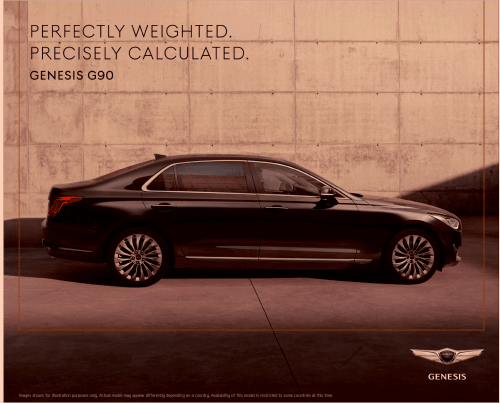
If you opened the Financial Times this weekend, on page 3, the slot reserved for beautiful women in the Sun and the Mirror, you would have seen the above advert.
For those of us in marketing this sepia image is just as arresting as bare bosoms. Here is a picture of a limousine. It looks expensive and the headline suggests that it is. The words “perfectly” and “precisely” indicate that considerable care have been taken in the assembly of this executive chariot.
Out of curiosity you would have looked for the name of the vehicle and you may have been teased. Unless you are a petrol head, you may have scratched your balding pate and wondered who the hell makes Genesis.
A quick Google search would have told you that this is the new flagship from Hyundai and it will set you back around £50,000. For this price you could have a pretty big Mercedes, BMW, Audi, a Porsche SUV or a Maserati. These are brands which carry respect when, at the local golf club, you are discussing the car you drive. Is that the reason Hyundai didn’t feature its name on the ad? Does Hyundai carry no weight or low weight?
And what does this mean to us as business to business marketers? Well first and foremost it tells us the importance of the brand. It tells us in this case that Hyundai know that its name may not help and indeed it may hinder. Furthermore, the designers of the ad may have figured that the absence of announcing which well-known car brand is behind the new model could generate curiosity. Readers with sufficient interest in the car may be encouraged to carry out an online search and find themselves reading up on the new model on the company’s website. Not stating the mother brand prompts a call to action. Could this work in business to business markets? Maybe, maybe not. There are very few occasions in b2b where we can create a Genesis, but that is not to say we shouldn’t think how we can tease our audiences to learn more through building curiosity into our ads.
Secondly, and very much to the point, this is a business to business transaction in the making. 99% of the buyers of the car will pay with a company cheque. The Financial Times is the right sort of media to give the upstart brand credibility. How much credibility it is hard to say. Sales of Genesis are likely to be in the low hundreds – if they are lucky. However, the sales of Genesis are not the endgame. We can see that the advert will push every other Hyundai model higher in people’s estimations. The launch of the new car may be judged a failure in terms of numbers sold but by raising the company image and all the benefits that go with it, they have done a good job.


